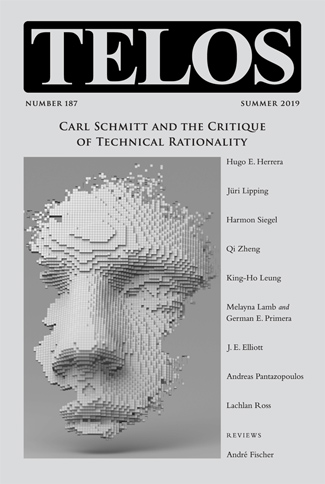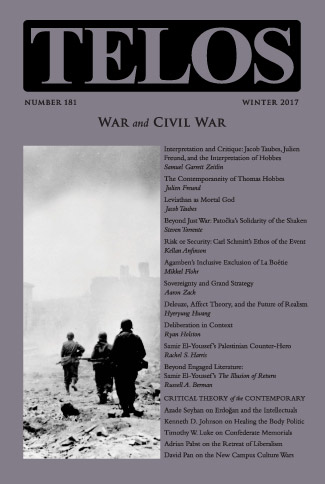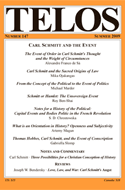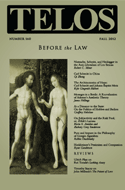By Telos Press · Tuesday, December 22, 2020 In today’s episode of the Telos Press Podcast, Camelia Raghinaru talks with Aryeh Botwinick about his article “Epistemological Skepticism, Textual Skepticism, and the Role of Constitutions,” from Telos 189 (Winter 2019). An excerpt of the article appears here. If your university has an online subscription to Telos, you can read the full article at the Telos Online website. For non-subscribers, learn how your university can begin a subscription to Telos at our library recommendation page. Purchase a print copy of Telos 189 in our online store.
Listen to the podcast here.
Continue reading →
Melayna Lamb and German E. Primera’s “Sovereignty between the Katechon and the Eschaton: Rethinking the Leviathan” appears in Telos 187 (Summer 2019). Read the full article at the Telos Online website, or purchase a print copy of the issue in our online store. Individual subscriptions to Telos are available in both print and online formats.
 This paper both rejects the reading of Thomas Hobbes’s Leviathan as a secularized katechon and rethinks anew the questions of sovereignty and politics in his thought. It does so by examining the eschatological character of his politico-theological understanding of the relation between the kingdom of the Leviathan and the kingdom of God. Indeed, through different contemporary readings of Hobbes’s theory of the state, this paper offers an insight into the concrete eschatology at operation in Hobbes’s thought and underscores its relevance for the understanding of government, biopolitics, and sovereignty. This is achieved through two different, albeit interconnected undertakings, which in turn allow us to agree but also to go beyond Giorgio Agamben’s claim that the state, in Hobbes, does not have a katechontic function. The first is an exposition of the a-teleological character of Hobbes’s eschatology and his metaphysics of motion. The second involves a consideration of the temporality and the nature of the relation between the ahistorical world of reason and the historical world of faith that underpins Hobbes’s theory of the state. Contrary to the contemporary interpretations in which Hobbes’s eschatology is presented as future regarding, we will highlight the chronological coincidence between the historical time of faith and the ahistorical time of the Leviathan, placing Hobbes within the political coordinates of Walter Benjamin’s messianism. By bringing this eschatological perspective to the fore, not only will the reading of Hobbes’s theory of sovereignty that aligns him with liberalism be problematized, but also an analysis of the resources that Hobbes offers to imagine a different form of politics will be developed. This paper both rejects the reading of Thomas Hobbes’s Leviathan as a secularized katechon and rethinks anew the questions of sovereignty and politics in his thought. It does so by examining the eschatological character of his politico-theological understanding of the relation between the kingdom of the Leviathan and the kingdom of God. Indeed, through different contemporary readings of Hobbes’s theory of the state, this paper offers an insight into the concrete eschatology at operation in Hobbes’s thought and underscores its relevance for the understanding of government, biopolitics, and sovereignty. This is achieved through two different, albeit interconnected undertakings, which in turn allow us to agree but also to go beyond Giorgio Agamben’s claim that the state, in Hobbes, does not have a katechontic function. The first is an exposition of the a-teleological character of Hobbes’s eschatology and his metaphysics of motion. The second involves a consideration of the temporality and the nature of the relation between the ahistorical world of reason and the historical world of faith that underpins Hobbes’s theory of the state. Contrary to the contemporary interpretations in which Hobbes’s eschatology is presented as future regarding, we will highlight the chronological coincidence between the historical time of faith and the ahistorical time of the Leviathan, placing Hobbes within the political coordinates of Walter Benjamin’s messianism. By bringing this eschatological perspective to the fore, not only will the reading of Hobbes’s theory of sovereignty that aligns him with liberalism be problematized, but also an analysis of the resources that Hobbes offers to imagine a different form of politics will be developed.
Continue reading →
By David Pan · Monday, June 17, 2019 Telos 187 (Summer 2019) is now available for purchase in our store. Individual subscriptions to Telos are also available in both print and online formats.
 After a modern era of technological progress that has led humans to believe in their increasing ability to control nature, we are reaching a point at which this power on a small scale has given way to increasing uncertainty and uncontrollability on the large scale. Not only are the specific effects of climate change difficult to predict and control, the only mechanisms available for such control—agreement and cooperation across national and cultural divides—are not the stuff of engineering but of politics. So with every technological advance that promises to bring us more control over our lives, we as a species are facing ever greater risks and uncertainties. The question concerning technology has become the unpredictability and uncontrollability of its development itself. The key difficulty is a problem of a tension between community or national interests and species-wide interests. While there might be an ethical imperative on a species-wide level to exercise self-restraint in pursuing dangerous technologies such as nuclear weapons, gene manipulation, or coal-fired power plants, such self-restraint could very well lead to the decline or even annihilation of the group that exercises it. The path forward will not be revealed by new technological advances, which can easily create more problems than they solve, but through the development of new ethical, political, and affective frameworks by which people understand themselves and their connections to the rest of the world. This issue of Telos, devoted to Carl Schmitt and the critique of technical rationality, investigates the ways in which Schmitt’s critique moved him toward ways of considering law, politics, and human history as fundamentally uncertain movements, requiring strategies that accept such unpredictability even as we try to intervene in our historical development as a species. After a modern era of technological progress that has led humans to believe in their increasing ability to control nature, we are reaching a point at which this power on a small scale has given way to increasing uncertainty and uncontrollability on the large scale. Not only are the specific effects of climate change difficult to predict and control, the only mechanisms available for such control—agreement and cooperation across national and cultural divides—are not the stuff of engineering but of politics. So with every technological advance that promises to bring us more control over our lives, we as a species are facing ever greater risks and uncertainties. The question concerning technology has become the unpredictability and uncontrollability of its development itself. The key difficulty is a problem of a tension between community or national interests and species-wide interests. While there might be an ethical imperative on a species-wide level to exercise self-restraint in pursuing dangerous technologies such as nuclear weapons, gene manipulation, or coal-fired power plants, such self-restraint could very well lead to the decline or even annihilation of the group that exercises it. The path forward will not be revealed by new technological advances, which can easily create more problems than they solve, but through the development of new ethical, political, and affective frameworks by which people understand themselves and their connections to the rest of the world. This issue of Telos, devoted to Carl Schmitt and the critique of technical rationality, investigates the ways in which Schmitt’s critique moved him toward ways of considering law, politics, and human history as fundamentally uncertain movements, requiring strategies that accept such unpredictability even as we try to intervene in our historical development as a species.
Continue reading →
By Russell A. Berman · Wednesday, December 13, 2017 Telos 181 (Winter 2017): War and Civil War is now available for purchase in our store.
 Consider the question: has American political life ever been as polarized as it is today? If the most appropriate answer is: yes, of course, in 1861, then the problem has been named and we are left with little comfort. The evaporation of anything like a bipartisan consensus in the political class leaves us staring at a battlefield, with few common bonds or shared attachments. Politics has become the internalization of war by other means. This is our version of the crisis of parliamentary democracy that Schmitt described in the Weimar years. Congressional Democrats are unwilling to cross the aisle to find room for compromise in the Trump era, but this only repeats the animosity among Republicans toward the Obama agenda eight years ago. Each party seeks its own advantage, which exclusively means the other party’s disadvantage, as the national good slips beneath the horizon. Each party focuses on mobilizing its base for votes and fund-raising, which means that each has an irresistible incentive to avoid solving those problems that are the most effective vehicles for rallying their supporters: when they held the majority, the Democrats preferred to keep the “dreamers” vulnerable, so as to be able to recycle them in future campaigns, just as the Republicans chose to punt on health care. Each issue is too successful in attracting voters, too valuable to give up. Consider the question: has American political life ever been as polarized as it is today? If the most appropriate answer is: yes, of course, in 1861, then the problem has been named and we are left with little comfort. The evaporation of anything like a bipartisan consensus in the political class leaves us staring at a battlefield, with few common bonds or shared attachments. Politics has become the internalization of war by other means. This is our version of the crisis of parliamentary democracy that Schmitt described in the Weimar years. Congressional Democrats are unwilling to cross the aisle to find room for compromise in the Trump era, but this only repeats the animosity among Republicans toward the Obama agenda eight years ago. Each party seeks its own advantage, which exclusively means the other party’s disadvantage, as the national good slips beneath the horizon. Each party focuses on mobilizing its base for votes and fund-raising, which means that each has an irresistible incentive to avoid solving those problems that are the most effective vehicles for rallying their supporters: when they held the majority, the Democrats preferred to keep the “dreamers” vulnerable, so as to be able to recycle them in future campaigns, just as the Republicans chose to punt on health care. Each issue is too successful in attracting voters, too valuable to give up.
Continue reading →
By Beau Mullen · Friday, March 7, 2014 As an occasional feature on TELOSscope, we highlight a past Telos article whose critical insights continue to illuminate our thinking and challenge our assumptions. Today, Beau Mullen looks at Gabriella Slomp’s “Thomas Hobbes, Carl Schmitt, and the Event of Conscription” from Telos 147 (Summer 2009).
 As Gabriella Slomp points out in the opening of her article “Thomas Hobbes, Carl Schmitt, and the Event of Conscription,” scholars are split on how to view the relationship between Hobbes and Schmitt. Some see Schmitt as Hobbes’s heir apparent, while others think that Schmitt’s thinking is in fact a rejection of much of Hobbes’s work. Both thinkers emphasize man’s warlike nature, they hold that the state exists to protect men from violent death at the hands of other men, and they maintain that a strong state with unlimited power is best suited to this aim. Both agree that man has an obligation to the state that is reciprocal to the duty of the state to provide security. In this piece, Slomp examines both Schmitt’s and Hobbes’s views of the extent of this obligation and comes to the conclusion that the two are in fact in disagreement. Using their writings on conscription, Slomp reveals that Hobbes has much more concern for the sovereignty of the individual whereas Schmitt never wavers in his affording primacy to the group or state. As Gabriella Slomp points out in the opening of her article “Thomas Hobbes, Carl Schmitt, and the Event of Conscription,” scholars are split on how to view the relationship between Hobbes and Schmitt. Some see Schmitt as Hobbes’s heir apparent, while others think that Schmitt’s thinking is in fact a rejection of much of Hobbes’s work. Both thinkers emphasize man’s warlike nature, they hold that the state exists to protect men from violent death at the hands of other men, and they maintain that a strong state with unlimited power is best suited to this aim. Both agree that man has an obligation to the state that is reciprocal to the duty of the state to provide security. In this piece, Slomp examines both Schmitt’s and Hobbes’s views of the extent of this obligation and comes to the conclusion that the two are in fact in disagreement. Using their writings on conscription, Slomp reveals that Hobbes has much more concern for the sovereignty of the individual whereas Schmitt never wavers in his affording primacy to the group or state.
Continue reading →
By Geoffrey Holsclaw · Thursday, October 25, 2012 Geoffrey Holsclaw’s “At a Distance to the State: On the Politics of Hobbes and Badiou” appears in Telos 160 (Fall 2012). Read the full version online at the Telos Online website, or purchase a print copy of the issue here.
 Amid the contested status of the State, juxtaposing the political thought of Thomas Hobbes and Alain Badiou will facilitate a renewed questioning of the State itself. Hobbes stands near the beginning of the tradition of those using “State” as a term for the impersonal form of political authority between ruler and ruled, understanding politics as culminating in the State. Badiou, on the other hand, while assuming the basic conviction of the impersonal nature of the State, theorizes a space for politics at a distance to the State. This encounter is promising not only because of their differences, but because of their similarities. Both take mathematics as the key to their philosophical method. Both envision the primary situation as a tumultuous “multitude” or “multiplicity.” And both understand politics as the creation of a “One.” Yet their overriding difference is manifest in the position of the State in relation to the production of the One, and therefore politics itself. For Hobbes, politics culminates in the formation of the One within the State, or rather, as the State. For Badiou, politics occurs as the pronouncement of a One at a distance to the State. After showing how Badiou moves through and beyond Hobbes, this essay explores the upshot of Badiou’s understanding of politics in relation to other political theories, particularly how recent proposals from within a pragmatist-Hegelian framework hold a hidden alliance with Hobbesian contract theory. Amid the contested status of the State, juxtaposing the political thought of Thomas Hobbes and Alain Badiou will facilitate a renewed questioning of the State itself. Hobbes stands near the beginning of the tradition of those using “State” as a term for the impersonal form of political authority between ruler and ruled, understanding politics as culminating in the State. Badiou, on the other hand, while assuming the basic conviction of the impersonal nature of the State, theorizes a space for politics at a distance to the State. This encounter is promising not only because of their differences, but because of their similarities. Both take mathematics as the key to their philosophical method. Both envision the primary situation as a tumultuous “multitude” or “multiplicity.” And both understand politics as the creation of a “One.” Yet their overriding difference is manifest in the position of the State in relation to the production of the One, and therefore politics itself. For Hobbes, politics culminates in the formation of the One within the State, or rather, as the State. For Badiou, politics occurs as the pronouncement of a One at a distance to the State. After showing how Badiou moves through and beyond Hobbes, this essay explores the upshot of Badiou’s understanding of politics in relation to other political theories, particularly how recent proposals from within a pragmatist-Hegelian framework hold a hidden alliance with Hobbesian contract theory.
Continue reading →
|
|


 As Gabriella Slomp points out in the opening of her article “Thomas Hobbes, Carl Schmitt, and the Event of Conscription,” scholars are split on how to view the relationship between Hobbes and Schmitt. Some see Schmitt as Hobbes’s heir apparent, while others think that Schmitt’s thinking is in fact a rejection of much of Hobbes’s work. Both thinkers emphasize man’s warlike nature, they hold that the state exists to protect men from violent death at the hands of other men, and they maintain that a strong state with unlimited power is best suited to this aim. Both agree that man has an obligation to the state that is reciprocal to the duty of the state to provide security. In this piece, Slomp examines both Schmitt’s and Hobbes’s views of the extent of this obligation and comes to the conclusion that the two are in fact in disagreement. Using their writings on conscription, Slomp reveals that Hobbes has much more concern for the sovereignty of the individual whereas Schmitt never wavers in his affording primacy to the group or state.
As Gabriella Slomp points out in the opening of her article “Thomas Hobbes, Carl Schmitt, and the Event of Conscription,” scholars are split on how to view the relationship between Hobbes and Schmitt. Some see Schmitt as Hobbes’s heir apparent, while others think that Schmitt’s thinking is in fact a rejection of much of Hobbes’s work. Both thinkers emphasize man’s warlike nature, they hold that the state exists to protect men from violent death at the hands of other men, and they maintain that a strong state with unlimited power is best suited to this aim. Both agree that man has an obligation to the state that is reciprocal to the duty of the state to provide security. In this piece, Slomp examines both Schmitt’s and Hobbes’s views of the extent of this obligation and comes to the conclusion that the two are in fact in disagreement. Using their writings on conscription, Slomp reveals that Hobbes has much more concern for the sovereignty of the individual whereas Schmitt never wavers in his affording primacy to the group or state.  Amid the contested status of the State, juxtaposing the political thought of Thomas Hobbes and Alain Badiou will facilitate a renewed questioning of the State itself. Hobbes stands near the beginning of the tradition of those using “State” as a term for the impersonal form of political authority between ruler and ruled, understanding politics as culminating in the State. Badiou, on the other hand, while assuming the basic conviction of the impersonal nature of the State, theorizes a space for politics at a distance to the State. This encounter is promising not only because of their differences, but because of their similarities. Both take mathematics as the key to their philosophical method. Both envision the primary situation as a tumultuous “multitude” or “multiplicity.” And both understand politics as the creation of a “One.” Yet their overriding difference is manifest in the position of the State in relation to the production of the One, and therefore politics itself. For Hobbes, politics culminates in the formation of the One within the State, or rather, as the State. For Badiou, politics occurs as the pronouncement of a One at a distance to the State. After showing how Badiou moves through and beyond Hobbes, this essay explores the upshot of Badiou’s understanding of politics in relation to other political theories, particularly how recent proposals from within a pragmatist-Hegelian framework hold a hidden alliance with Hobbesian contract theory.
Amid the contested status of the State, juxtaposing the political thought of Thomas Hobbes and Alain Badiou will facilitate a renewed questioning of the State itself. Hobbes stands near the beginning of the tradition of those using “State” as a term for the impersonal form of political authority between ruler and ruled, understanding politics as culminating in the State. Badiou, on the other hand, while assuming the basic conviction of the impersonal nature of the State, theorizes a space for politics at a distance to the State. This encounter is promising not only because of their differences, but because of their similarities. Both take mathematics as the key to their philosophical method. Both envision the primary situation as a tumultuous “multitude” or “multiplicity.” And both understand politics as the creation of a “One.” Yet their overriding difference is manifest in the position of the State in relation to the production of the One, and therefore politics itself. For Hobbes, politics culminates in the formation of the One within the State, or rather, as the State. For Badiou, politics occurs as the pronouncement of a One at a distance to the State. After showing how Badiou moves through and beyond Hobbes, this essay explores the upshot of Badiou’s understanding of politics in relation to other political theories, particularly how recent proposals from within a pragmatist-Hegelian framework hold a hidden alliance with Hobbesian contract theory. 






